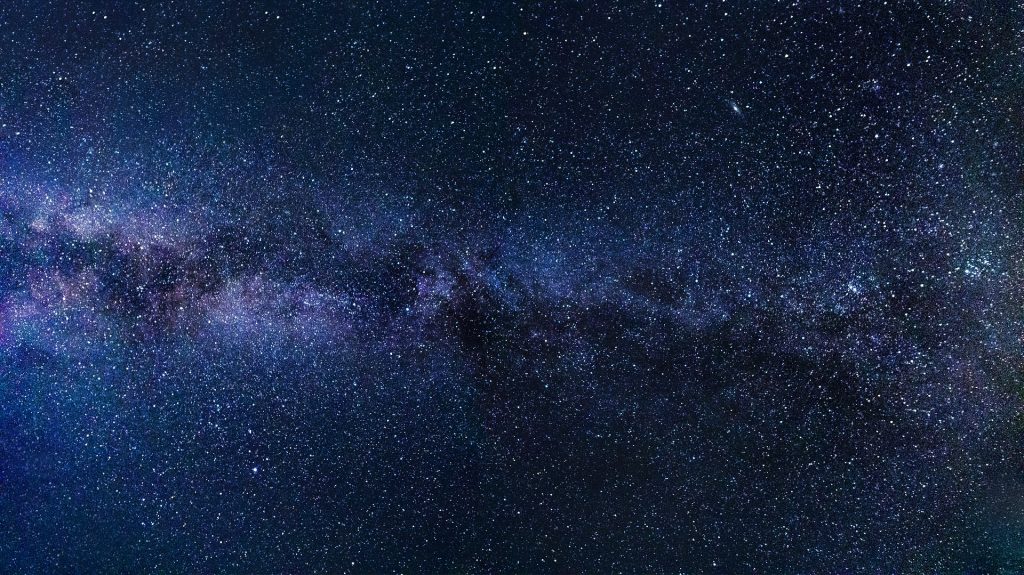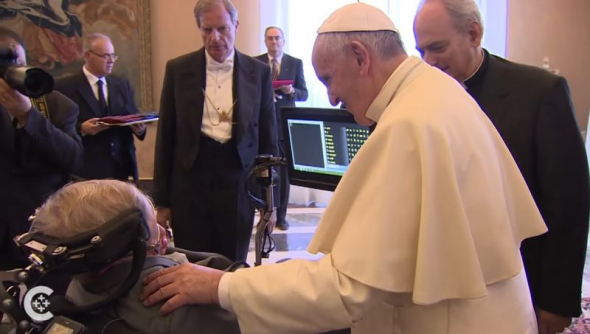The New York Times and other media outlets reported on Tuesday evening the death of Stephen Hawking, physicist and author, at the age of 76, years longer than doctors believed he would live after his diagnosis with ALS (amyotrophic lateral sclerosis, or Lou Gehrig’s Disease) in 1963.
Hawking believed that the science of the cosmos disproved the existence of God, though his research had an element of grace to it, as the New York Times describes his application of quantum theory to the understanding of black holes:
In a long and daunting calculation, Dr. Hawking discovered to his befuddlement that black holes — those mythological avatars of cosmic doom — were not really black at all. In fact, he found, they would eventually fizzle, leaking radiation and particles, and finally explode and disappear over the eons.
Nobody, including Dr. Hawking, believed it at first — that particles could be coming out of a black hole. “I wasn’t looking for them at all,” he recalled in an interview in 1978. “I merely tripped over them. I was rather annoyed.”
That calculation, in a thesis published in 1974 in the journal Nature under the title “Black Hole Explosions?,” is hailed by scientists today as the first great landmark in the struggle to find a single theory of nature — to connect gravity and quantum mechanics, those warring descriptions of the large and the small, to explain a universe that seems stranger than anybody had thought.
The discovery of Hawking radiation, as it is known, turned black holes upside down. It transformed them from destroyers to creators — or at least to recyclers — and wrenched the dream of a final theory in a strange, new direction.
Hawking said that a human being would not return from leaping into a black hole, “but his mass energy will come back. Maybe that applies to the whole universe.”
In 2014, NBC News quoted the Spanish newspaper El Mundo, which interviewed Hawking about space travel, human immortality and the existence of God:
In the past, there’s been a tiny bit of ambiguity: In “A Brief History of Time,” Hawking writes that the discovery of a unifying set of scientific principles known as the theory of everything would enable scientists to “know the mind of God.” But in a follow-up book about the quest for the theory of everything, titled “The Grand Design,” Hawking said the mechanism behind the origin of the universe was becoming so well known that God was no longer necessary.
El Mundo’s Pablo Jauregui asked about those two references to God in one of the questions he prepared for Hawking to answer, and here’s the scientist’s response:
“Before we understand science, it is natural to believe that God created the universe. But now science offers a more convincing explanation. What I meant by ‘we would know the mind of God’ is, we would know everything that God would know, if there were a God, which there isn’t. I’m an atheist.”
Hawking addressed the issue more delicately several years ago when he told Reuters that he was “not religious in the normal sense,” and said “God does not intervene to break the laws” that He decreed. Since then, however, there’s been a lot more theorizing devoted to the origin of the universe. Hawking now believes that an approach known as M-theory will eventually reveal the grand design of the cosmos.
“In my opinion, there is no aspect of reality beyond the reach of the human mind,” Hawking told El Mundo.
And in 2016, Hawking and Pope Francis met each other in a Rome conference on the Big Bang, covered by the Catholic lay publication Aleteia:
[According to Hawking,] Although the Big Bang is a well-accepted theory among experts, and it is fundamental for the formation of galaxies and planets, there is still no convincing answer to what happened before the explosion, what caused it, and consequently the reason for existence. Nevertheless, the theory fits into a logical explanation of the universe. “The message of science is that we are the children of logic and not of chaos,” explained Italian nuclear physicist Antonino Zichichi, a colleague of Hawking, in an interview with Vatican Radio.
For Pope Francis, the Big Bang is a manifestation of God’s love:
Similarly, he holds that science and its discoveries do not deny the existence of God; on the contrary, evolution (for example) is part of God’s design for His creation.
“Creation has been progressing for centuries and centuries, millennia and millennia, until becoming as we know it today, precisely because God is not a demiurge or a magician, but the Creator who gives life to all beings.
“The beginning of the world was not a work of chaos that owes its origin to another, but derives directly from a supreme Principle who creates out of love.
“The Big Bang theory, which is proposed today as the origin of the world, does not contradict the intervention of a divine creator but depends on it. Evolution in nature does not conflict with the notion of Creation, because evolution presupposes the creation of beings who evolve,” Francis explained.
Hawking’s children released a statement yesterday following his death:
“We are deeply saddened that our beloved father passed away today. He was a great scientist and an extraordinary man whose work and legacy will live on for many years. His courage and persistence with his brilliance and humour inspired people across the world. He once said, ‘It would not be much of a universe if it wasn’t home to the people you love.’ We will miss him forever.”
Lower image: Catholic News Service via the Christian Post


